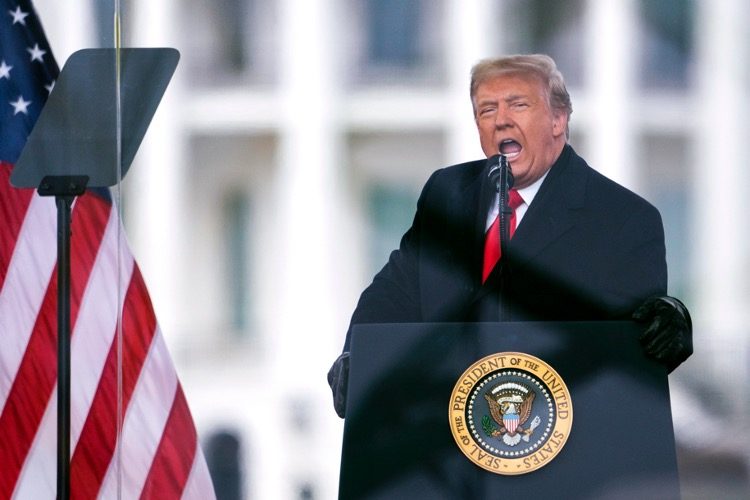
Three judges from the D.C. Circuit Court of Appeals ruled unanimously on Tuesday that former President Donald Trump does not have immunity for his actions related to the January 6, 2020, incident.
It’s almost enough to note that two of those judges were appointed by President Joe Biden, who would like nothing better than to see his erstwhile and likely opponent in November be convicted of something — anything — related to J6.
The judges had to fudge their decision in order to work around a ruling in the nation’s most important decision in American constitutional law: Marbury v. Madison (1803). They also had to do a workaround of Thomas Jefferson’s explanation about the proper procedure to follow when attempting to impeach and then prosecute a former president.
No matter. The three, including a third appointed years ago by then-President George H.W. Bush in 1990 — Karen LeCraft Henderson, who will celebrate her 80th birthday this coming July — were up to the task.
They began the inquisition by stating its conclusion:
Former President Trump moved to dismiss the Indictment and the district court denied his motion. Today, we affirm the denial.
For the purpose of this criminal case, former President Trump has become citizen Trump, with all of the defenses of any other criminal defendant.
But any executive immunity that may have protected him while he served as President no longer protects him against this prosecution.
First, they assured themselves that Trump was guilty of all four counts for which has been indicted:
Former President Trump did not concede the 2020 election and, in the ensuing months, he and his supporters made numerous attempts to challenge the results.
Many of their attempts were allegedly criminal.
A District of Columbia federal grand jury indicted former President Trump on four criminal counts arising from the steps he allegedly took to change the outcome of the election: (1) conspiracy to defraud the United States by overturning the election results, in violation of 18 U.S.C. § 371; (2) conspiracy to obstruct an official proceeding — i.e., the Congress’s certification of the electoral vote — in violation of 18 U.S.C. § 1512(k); (3) obstruction of, and attempt to obstruct, the certification of the electoral vote, in violation of 18 U.S.C. §§ 1512(c)(2), 2; and (4) conspiracy against the rights of one or more persons to vote and to have their votes counted, in violation of 18 U.S.C. § 241.
At this stage of the prosecution, we assume that the allegations set forth in the Indictment are true.
Several obstacles had to be overcome or at least mitigated: Marbury v. Madison, and Federalist Paper 69.
The trio made short shift of the nation’s most important decision in Marbury:
[Trump] relies on Marbury’s oft-quoted statement that a President’s official acts “can never be examinable by the courts.” Id. (quoting Marbury, 5 U.S. (1 Cranch) at 166); see also Reply Br. 6.
[But] former President Trump misreads Marbury and its progeny. Properly understood, the separation of powers doctrine may immunize lawful discretionary acts but does not bar the federal criminal prosecution of a former President for every official act….
[F]ormer President Trump’s actions allegedly violated generally applicable criminal laws, meaning those acts were not properly within the scope of his lawful discretion; accordingly, Marbury and its progeny provide him no structural immunity from the charges in the Indictment.
In Federalist Paper 69, Thomas Jefferson wrote, “The President of the United States would be liable to be impeached, tried, and, upon conviction of treason, bribery, or other high crimes or misdemeanors, removed from office, and would afterwards be liable to prosecution and punishment in the ordinary course of law.”
Trump’s lawyer, D. John Sauer, claimed that prosecution for those alleged J6 crimes could only begin after a successful impeachment of Trump. Since he was impeached by the House but not convicted by the Senate, all that has followed it without substance and is irrelevant.
The trio was not impressed, and upheld the lower court’s ruling against Trump’s claim of immunity:
We have balanced former President Trump’s asserted interests in executive immunity against the vital public interests that favor allowing this prosecution to proceed.
We conclude that “[c]oncerns of public policy, especially as illuminated by our history and the structure of our government” compel the rejection of his claim of immunity in this case.
We also have considered his contention that he is entitled to categorical immunity from criminal liability for any assertedly “official” action that he took as President — a contention that is unsupported by precedent, history or the text and structure of the Constitution.
Finally, we are unpersuaded by his argument that this prosecution is barred by “double jeopardy principles.”
Accordingly, the order of the district court is AFFIRMED.
The trio graciously granted Trump’s attorneys six days to file an appeal to the Supreme Court. Those lawyers are no doubt scrambling to craft an even more substantive and robust appeal to the high court, which already has its collective hands full considering other appeals from lower court rulings against Trump.



